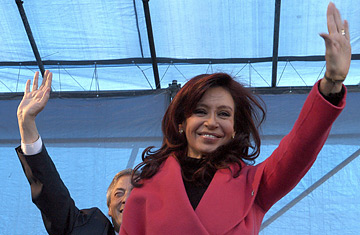
Crisitina Fernandez de Kirchner
With both Evita and Isabel Peron still in its living memory, Argentina is not unused to the idea of conjugal succession to the presidency. Still, it is a startling political development that the current First Lady, a left-leaning firebrand senator named Cristina Kirchner, will run for the presidency in the country's upcoming October elections. Her husband, incumbent Peronist President Nestor Kirchner, who remains more popular than his wife in the polls, will step aside from seeking reelection after four successful years in office.
Mrs. Kirchner, who represents the province of Buenos Aires, has a reputation as an implacable anti-corruption fighter with little time for traditional political niceties. She has ruffled feathers even within the couple's Peronist party and is seen by observers as a more temperamental and radical politician than her husband. President Kirchner, on the other hand, is a mild and soft-spoken operator who rescued Argentina from the agonizing economic crisis that followed the country's default on its foreign debt in late 2001. Assuming office in 2003, President Kirchner broke with traditional free-market economic recipes, settled the country's debt with the International Monetary Fund and ushered in a recovery that has kept his popularity rating at an unusually high level — at more than 50% in many recent polls. In the meantime, he has pursued a vigorous human rights policy, reopening trials against the officers of Argentina's bloody 1976-83 dictatorship.
But while President Kirchner has been careful not to antagonize opponents and investors by veering too far to the left, Mrs. Kirchner is expected to pursue more radical policies, especially regarding alignment with Venezuela's President Hugo Chavez.
Mrs. Kirchner, or "Cristina" as she is known in the media and as she is referred to by her fellow Peronists, will formally launch her candidacy at a rally on July 19 in her native city of La Plata. That will end a year of rumor and speculation during which the Kirchners refused to comment on which of the two of them would run for the presidency.
The move is particularly startling because President Kirchner actually leads the First Lady in the most recent polls, at a 55% approval rating, according to one survey, to her 45%. The same polls show that, in any case, either Kirchner would easily defeat the leading opposition candidate, the middle-of-the-road anti-corruption candidate Elisa Carrio of the ARI party, who has only a 12% rating. Kirchner's former economy minister Roberto Lavagna, who is seen by many as having masterminded Argentina's recovery from the economic chaos that preceded Kirchner, has only an 11% chance.
But the opposition senses an opportunity too. Mrs. Kirchner's comparatively lower popularity has led them to feel optimistic about forcing a second round of voting if she cannot obtain the necessary percentage to win outright in a first round in the October 28 polls. "It is clear Cristina is the weaker candidate," said Senator Gerardo Morales, the vice-presidential candidate on Lavagna's ticket.
Political analyst Rosendo Fraga says that President Kirchner — an outsider in his own party — feels Cristina has a better chance of recruiting political support from outside traditional Peronist voters: "The electoral role of Cristina is very important because President Kirchner lacks support in the Peronist party structure; furthermore, he actually mistrusts the party structure." The timing appears to be keyed to Peronist setbacks in a number of recent provincial elections. The most resounding was a defeat in the federal capital of Buenos Aires, in which the conservative millionaire businessman and Boca football club president Mauricio Macri won an astounding 61% of the vote against the Peronist Education Minister Daniel Filmus.
Fraga also feels the president is wary of accusations he has ambitions for a life-long term in office: "Kirchner is also launching his wife's candidacy to show that he doesn't have ambitions to hang on to power indefinitely." Nevertheless, Fraga speculates that Mrs. Kirchner's announced candidacy, if successful, could well allow President Kirchner to run for reelection in 2011, when he hopes such criticism will have abated, the Kirchners then succeeding each other in office on a long-term basis. Says Fraga: "Kirchner has made a tactical retreat, but he has not abandoned his objective of retaining power, allowing his wife one or two terms and then following her himself."
Whether that is the Kirchners' plan remains to be seen. But it is all within the realm of Argentine political tradition. President Juan Peron's second wife Eva (or Evita, as she has become known in history and musical theater) was clearly his equal and, if not for her early death, may have become his successor. Peron's third wife Isabel was elected as his Vice-President and did succeed him after he died in the presidency in 1974. She was deposed by a military coup in 1976.
